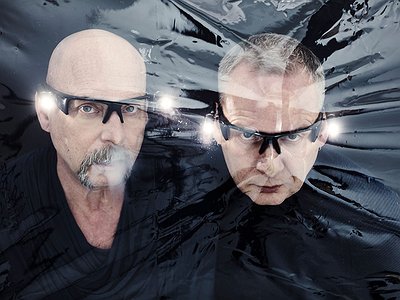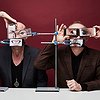Part 2
Collaborations can take on many forms. What role do they play in your approach and what are your preferred ways of engaging with other creatives through, for example, file sharing, jamming or just talking about ideas?
I like talking to other creatives, but for collaboration I prefer to be in the same room working together. I think you get to where you want to be much quick, bouncing ideas around in real time.
Could you take us through a day in your life, from a possible morning routine through to your work? Do you have a fixed schedule? How do music and other aspects of your life feed back into each other - do you separate them or instead try to make them blend seamlessly?
I go to work 5 days a week every day from around 8:30 till 5pm. Once the children have gone to school, I drive to the studio about 3 miles away. It’s an old warehouse with around 9 music studios. I do any hour or so then, as the other guys arrive at work, we sit and have a coffee and a gossip. I finish whatever I’m doing around 5 then go home to the family. It’s very important to have a home life for me as I’d have nothing for inspiration. I really like having a separation between writing and home life, although I’m never that far away from a laptop and synth …
Could you describe your creative process on the basis of a piece or album that's particularly dear to you, please? Where did the ideas come from, how were they transformed in your mind, what did you start with and how do you refine these beginnings into the finished work of art?
For the ‘Monsters Exist’ album it started with the title track, which came from an idea while working on a documentary. I had a piece that fitted really well with a section of the documentary about nuclear warheads and that got me thinking. Once that track was complete, with the title ‘Monsters Exist’, the rest of the album fell into place. I always have a lot of demos floating around. Once you’ve got an idea for an album certain songs, demos and ideas come to front. It’s then a case of seeing how it all fits together like a jigsaw puzzle and seeing what really works and what doesn’t. Then as more pieces fall into place it become clearer what the album is and how you need to proceed.
There are many descriptions of the ideal state of mind for being creative. What is it like for you? What supports this ideal state of mind and what are distractions? Are there strategies to enter into this state more easily?
It’s all about being in the now for me. As soon as you are distracted or have doubts, it’s all over. It’s time to stop for a moment, have a cup of tea or a walk, then get back into the zone. I find if you just go at it with an idea but no expectations it works best. Be open and explore your idea honestly. I think you get better at this as you get older.
How is playing live and writing music in the studio connected? What do you achieve and draw from each experience personally? How do you see the relationship between improvisation and composition in this regard?
Studio is for creating, live is for presenting. You can be precise and deliberate or improvise in both environments, but that’s the real difference. The studio is private and live is a spectator sport!
I love writing in the studio but it is always such a thrill to take it out of that world and play your work to people, see what they think, see how you feel about it.
How do you see the relationship between the 'sound' aspects of music and the 'composition' aspects? How do you work with sound and timbre to meet certain production ideas and in which way can certain sounds already take on compositional qualities?
Sound is your pallet, composition is bending that pallet to your will. The pallet can suggest a compositional direction but generally I create a pallet for the composition. Having said that I did create a massive field recording library a few years back that I still use. But because I made it, it’s very suitable to the way I create so the two feed into each other at this point.
Our sense of hearing shares intriguing connections to other senses. From your experience, what are some of the most inspiring overlaps between different senses - and what do they tell us about the way our senses work? What happens to sound at its outermost borders?
I see sound as colour and shape, always have. So vision and sound are the closest linked to me. Smell is a great bringer of memory so can be good for inspiration but no other link for me with the senses. I think because sound is linked with movement on our fight or flight response, that’s why the two are so interwoven. If a tiger is rushing at you it’s useful to both see and hear it. Might be useful to smell it too…
Art can be a purpose in its own right, but it can also directly feed back into everyday life, take on a social and political role and lead to more engagement. Can you describe your approach to art and being an artist?
I tend to score what I feel. I like to point people in directions and provoke thought but try not to draw too many conclusions. I think it’s good to inspire, not so much to preach. As an artist, I try to be honest, which pretty much covers anything I want to do.
It is remarkable, in a way, that we have arrived in the 21st century with the basic concept of music still intact. Do you have a vision of music, an idea of what music could be beyond its current form?
No, it is what it is. It’s a time-based art medium like books and film, you can’t have it without spending the allotted time on it. It’s all about a bit of “now” time whether that’s solitary, laying down at home with head phones or collectively, late night in a rave with 2,000 people. It’s all about the now.






